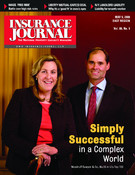Existing carriers complain that plan to give 3-year high risk exemption to newcomers creates uneven playing field
The Patrick administration is pushing a rule that exempts new auto insurers in Massachusetts from having to accept costly high risk drivers for the first several years of operating in the state — a rule existing insurers required to accept such risks have denounced as unfair.
Under the rule, newcomers to the state’s private passenger auto insurance market in 2008 would not be assessed for high risks until 2011, with their assessment based on their sales in 2010.
Insurance Commissioner Nonnie Burnes has already implemented the rule under her emergency powers but she solicited feedback on it at a recent hearing. She has yet to rule whether she will keep the rule as is or change it.
According to backers of the rule, the almost three-year lag period is necessary so that a new carrier in the market has time to build a year of sales upon which high risk assignments can then be based; otherwise assignments would be based on speculation about how much business the new carrier might write. They argue that the rule is consistent with the way some 40 other states with assigned risk plans similar to the Bay State’s treat new entrants.
But established Bay State players including Arbella Mutual, Plymouth Rock and Encompass say the rule would give new carriers a “free ride” at their expense. The newcomers would not only avoid having to accept assigned risks but also would have the advantage of being able to price policies without factoring in the cost of high risk drivers, which by one estimate could be as much as $100 per policy.
The controversy over the rule comes in the first month of a new managed competition pricing system and implementation of a new assigned risk plan to apportion high risk drivers among insurers. The new Massachusetts Assigned Insurance Plan was created in part in response to complaints that the previous high risk plan did not distribute the high risk burden fairly but favored certain domestic insurers that knew how to manipulate it to their benefit.
According to John Kittel, executive vice president of Arbella Mutual, the new MAIP rule issued by Burnes promises a return to the days of unequal distribution of the residual market burden. It would create “artificial advantages” for newcomers that are “potentially detrimental” to competition, he said.
Subsidy for New Entrants
“By providing new entrants with a free ride, during which time they need not write any assigned risks, the rest of the market is subsidizing the new entrant. The new entrant essentially transfers the burden of the residual market to existing writers, and the new entrant can price their business without regard to the residual market load,” he said.
Kittel cites an analysis that suggested a new carrier could price an average risk $100 less than any competitor under this scheme and could write millions of dollars in business without having to assume any residual market impact.
Unlike in other states, assigned risk drivers in the Bay State can’t be charged rates higher than those charged in the voluntary market so insurers must recover the extra cost of these higher risks in their voluntary rates. Thus new entries are given a pricing advantage by not having to account for this expense, argue the established players, argue opponents of the three-year reporting reprieve.
Advocates of the new rule point out, however, that although other states in theory allow higher rates for assigned risks, regulators in those states often delay approval of these higher rates thus the carriers do not gain the benefit. Also the costs of entering the state would wipe out any advantage of a delay in paying for high risks in Massachusetts, they say.
Progressive, whose online division (but not its independent agent unit) will begin selling car insurance in the state in May, is among those backing the rule. The company told Burnes that the concerns raised “are blown out of proportion” and that existing carriers will actually benefit from the rule exempting newcomers for a period of time from assigned risks.
According to Emily A. Vlasich, corporate counsel for Progressive, the more new carriers the state attracts to write auto business, the smaller the residual market will be and this will, in turn, mean fewer assigned risk assignments for existing carriers.
She cited experience in New Jersey where she said the residual market shrunk from 5.9 percent of the market in 2003 to 1.6 percent by 2007 following the entry of GEICO, Progressive, Mercury General and other carriers. These new entrants were not required to accept residual market assignments during their initial years but their entry reduced the size of the residual market “far more than their voluntary market share would have represented in terms of assignments,” claimed Vlasich.
Vlasich projected that based on its experience in other states, Progressive’s actual share of the residual market will be “zero” after credits for its voluntary writings are applied.
Michael W. O’Malley, senior vice president, Chubb, which does not now write auto in the state but appears to be considering entry, also applauded the rule. He said calling it a “free ride” is a mischaracterization of what is really a period of transition before newcomers have to report their writings. O’Malley said a “time lag in data reporting is essential to achieving true equitable apportionment of the market’s assigned risk obligations.”
Back in the late 1980s, when its auto insurance market was in turmoil and insurers were exiting, the state offered an incentive for so-called “newly-emerging” companies that relieved them of some of their high risk assessments, a benefit some of the insurers now established in the market used to their benefit. That Rule 11 lowered the assessments of companies that were growing rather than shrinking their market share in the state.
Topics Carriers Auto Massachusetts
Was this article valuable?
Here are more articles you may enjoy.


 Big I Celebrates Continued Tax Deduction for Many Independent Agents
Big I Celebrates Continued Tax Deduction for Many Independent Agents  Marsh Suit Against Alliant Alleges Poaching of Commercial Surety Team, Accounts
Marsh Suit Against Alliant Alleges Poaching of Commercial Surety Team, Accounts  Erie Insurance Restores All Operations After Month Outage; Says No Data Breached
Erie Insurance Restores All Operations After Month Outage; Says No Data Breached  CRC Group Agrees to Acquire Lloyd’s Managing Agency Atrium Underwriting Group
CRC Group Agrees to Acquire Lloyd’s Managing Agency Atrium Underwriting Group 


